Emergency Dentist — Fort Worth, TX
Fast, Pain-Relieving Emergency Dental Care

Dental emergencies always occur at the most stressful, unexpected moments, which is why it’s always important to be prepared and have the number of an emergency dentist in Fort Worth. When you call our dental office, one of our dental professionals will walk you through first-aid steps and schedule an appointment for you as soon as possible. That way, you won’t have to sit in pain all day. When you get to our dental office, you’ll finally be able to relax knowing that you’re in good hands to receive effective, pain-relieving emergency dentistry in Fort Worth.
Why Choose Drennan Family Dentistry
for Emergency Dental Care?
- Accepting Patients of All Ages
- Personal, Attentive Dentistry
- Pain-Relieving Root Canal Therapy
What to Do in a Dental Emergency

- Call our office. The sooner you contact us, the better chance we have of resolving your situation as quickly as possible. Over the phone, we’ll explain how you can manage your emergency in the meantime.
- See Dr. Drennan or Dr. Carlson for an emergency exam. They will perform a detailed exam and take X-rays to identify the root cause of the problem. Based on their findings, they will create a custom treatment plan to get your oral health back on the right track.
- Get the care you need. During your appointment, our team may be able to temporarily relieve your pain. However, you might have to return to the office for additional treatment to properly address your dental emergency. Common solutions include tooth-colored fillings, dental crowns, root canal therapy, and tooth extractions. Additionally, we will schedule a follow-up visit for a comprehensive exam to address other dental needs and establish routine care at our office for your long-term oral health.
The Most Common Dental Emergencies
It’s difficult to be prepared for a dental emergency, and if you’re not, it’s hard to make a sound decision on handling it in order to prevent additional damage from occurring. No matter what, it’s always important to contact our dental office first so we can provide you with necessary guidance. Otherwise, we’ve also included some helpful tips below, while you’re on your way to our dental office.
Understanding the Cost of Emergency Dentistry
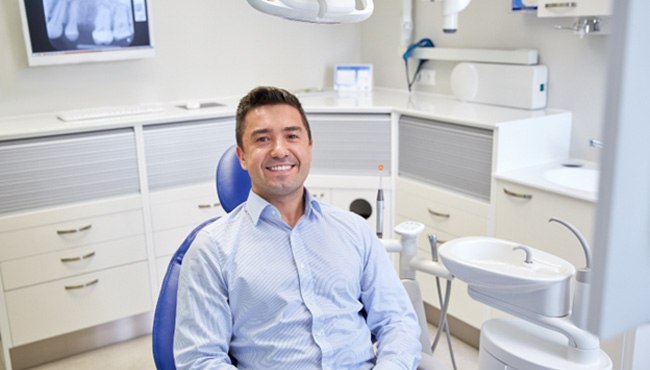
The top priority for your emergency dental care should be to stop your pain and protect your smile from further harm. As such, we will only recommend treatments that you truly need, and we will make sure that you fully understand the costs involved before moving forward. Our team can review your payment options with you and help you come up with a plan to get the care you need without putting too much of a strain on your budget.
Every Dental Emergency is Different

“Dental emergency” can refer to a variety of situations, from a painful toothache to a broken restoration to a knocked-out tooth. The kind of treatment we recommend will depend on the underlying cause of the problem and the extent of the damage. This means that it’s essentially impossible to know how much your care will cost until a thorough examination has been performed. Don’t worry; we’ll always explain the relevant pricing information before you have to make any commitments.
Does Dental Insurance Cover Dental Emergencies?
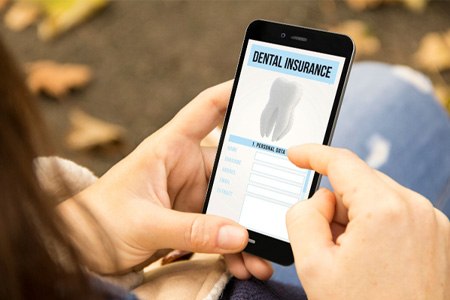
Most dental insurance plans include coverage for at least one emergency exam per year, and they typically help pay for root canal therapy, dental crowns, and various other treatments that are often required as part of emergency care. Before you begin any kind of dental treatment, you should call your insurance company and confirm the details of your specific plan.
Our team will happily file claims on your behalf so that you can get the coverage you deserve without having to worry about the paperwork. We can also answer any insurance-related questions you might have.
Other Options for Making Dental Emergencies Affordable

Some employers offer Health Savings Accounts (HSAs) and Flexible Spending Accounts (FSAs) to help their employees pay for a variety of medical expenses, which includes dental care. If you don’t have adequate insurance coverage for a specific treatment, you can also use your HSA or FSA to help manage the cost.
Our goal is to make sure that our patients have access to excellent dental care when they need it most, which is why our team will work with you to figure out the best way to make your treatment as affordable as possible.
Taking Care of Your Smile Can Save You Money

The majority of dental emergencies are the ultimate result of tooth decay, oral infections, and other issues that develop over time. Keeping up with your routine checkups and cleanings can help stop the small problems from turning into major oral health issues, potentially saving you a lot of money on urgent dental care.
If you do notice signs of a dental emergency, you should call your dentist right away even if you’re worried about the cost. Delaying your care could make the problem worse, meaning you’ll likely need more complex (and more expensive) treatment in the long run.
Keys to Preventing Dental Emergencies
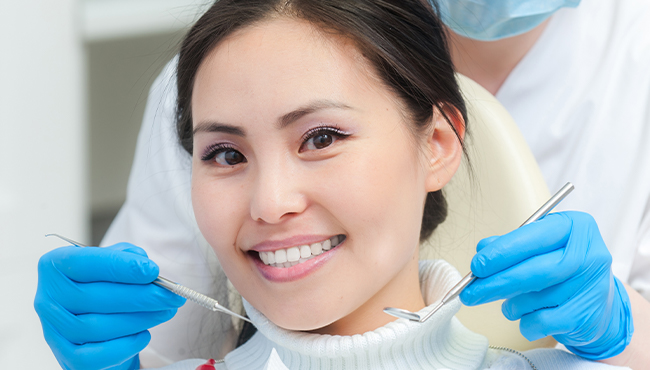
Realistically, it isn’t possible to prevent dental emergencies from occurring; however, there are still several precautionary measures you can take to drastically reduce your chances of sustaining a serious dental injury. Keep reading to learn a little more about a few different ways you can protect your smile and ultimately prevent a dental emergency in Fort Worth from happening in the first place.
Visit Your Dentist Regularly

Regular preventive dental care is arguably the best way you can actively prevent dental emergencies from occurring in the first place, since these visits help to ensure that your mouth is in optimal health. Our team can carefully inspect and thoroughly clean your mouth at a detailed level that you’re unable to carry out yourself at home, meaning that the likelihood of you later experiencing an unexpected dental emergency is radically lowered.
Maintain Good Oral Hygiene at Home
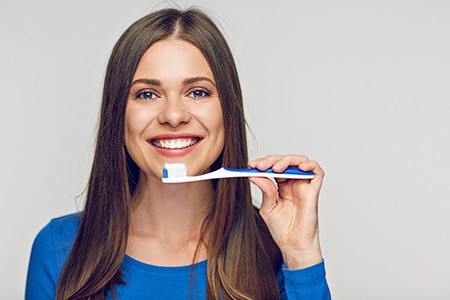
When you aren’t seated in the dentist’s chair, it falls on you to take care of your pearly whites—which means maintaining an excellent oral hygiene routine at home. You should brush your teeth twice a day for two minutes each time, using a soft-bristled toothbrush coupled with a fluoride toothpaste. In addition to brushing, you need to also floss daily; flossing allows you to clean the places in your mouth that your toothbrush cannot access. Rinsing with an antibacterial mouthwash is also worthwhile.
Stick to a Nutritious Diet

It’s well-known that sugary and starchy items contribute to tooth decay and cavities, meaning that maintaining a healthy diet is paramount when it comes to preventing dental emergencies. You should add plenty of vitamin- and nutrients-rich foods to your diet, including plenty of hearty fruits and vegetables, low-fat dairy products, lean proteins, and more. You should also avoid overindulging in sugary drinks like sodas, energy drinks, or sports drinks, and opt to drink water when possible; it stimulates the flow of saliva inside your mouth and is by far the best beverage for your oral health.
Wear a Mouthguard
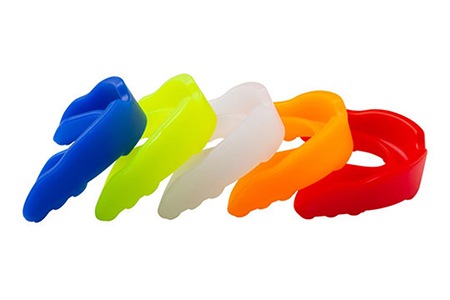
Mouthguards are an incredibly effective preventive solution for patients that frequently participate in sports, exercise, or other physical activities that increase the risk of oral injury. These nifty little devices are able to redistribute the force of impact across your whole mouth, rather than just the point of contact. You can also look into getting a custom-made nightguard if you suffer from bruxism, or teeth grinding.
Don’t Use Your Teeth as Tools
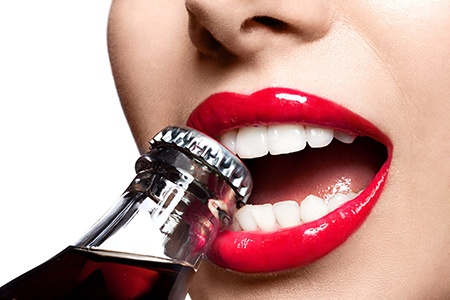
Your teeth are meant for biting and chewing food, and that’s pretty much it! As tempting or convenient as it might seem, you should refrain from using your teeth as tools. The last thing you’d want to happen is to sustain a dental emergency while using your teeth to tear open a package, hold your car keys, or unscrew a bottlecap. These bad habits can easily lead to a chipped, fractured, or otherwise injured tooth or dental restoration.
Dental Emergency FAQs
Will My Toothache Go Away on Its Own?
Despite popular belief or wishful thinking, toothaches don’t heal or go away on their own. In fact, a once-painful toothache that has disappeared could be a sign of an infection that needs immediate dental attention; the very nerve of the tooth could be damaged! Sometimes the pain can also dissipate if it was caused by something like an object lodged between your teeth. In any case, if your tooth has been hurting for more than a day, you shouldn’t hesitate to contact us for assistance!
My Chipped Tooth Doesn’t Hurt; Do I Still Need a Dental Visit?
If you’ve sustained a chipped tooth, you might feel as though your situation doesn’t warrant emergency treatment, especially if the tooth doesn’t hurt. But it’s still a good idea to schedule an appointment with us; the inner layers of the tooth could still be vulnerable to damage! Not to mention, the tooth might fracture even further without professional care, resulting in increased sensitivity, soreness, and overall discomfort.
What Should I Store Inside of My Emergency Dental Kit?
One of the best ways you can stay prepared for an unexpected dental emergency is by having an emergency kit ready to go! This doesn’t need to be anything expensive or fancy, but you should at least try to include the following items:
- Cotton balls, gauze pads, and sterile gloves.
- A small plastic container (for displaced teeth or restorations).
- Over-the-counter pain medications such as Ibuprofen.
- Dental wax.
- A card with your emergency dentist’s contact information.
Should I Go to the Emergency Room for a Dental Emergency?
The world can come to a screeching halt when you experience a dental emergency, but generally, you shouldn’t go to an emergency room in these instances. This might seem counterintuitive, but emergency rooms and their personnel often don’t have the necessary means to deal with toothaches or other serious oral injuries. While they can usually provide you with pain medication or antibiotics, it’s always going to be in your smile’s best interest to visit an emergency dentist first, as they’ll be able to provide pain relief and address the root of the issue! However, it’s worth noting that for broken or dislocated jawbones, serious cuts and lacerations, and swelling that impacts your ability to breathe or swallow, an emergency room is your best option.
How Can I Sleep with Tooth Pain?
If you contact our office in Fort Worth for an emergency appointment, you can count on us to try to get you in for an appointment as soon as possible. However, emergencies often occur at night or on the weekends, outside of normal business hours.
For example, you might develop a toothache one evening after dinner that makes it difficult to fall asleep. If you’re struggling to get some much-needed rest, you can try elevating your head on several pillows or sleeping in your favorite recliner. This prevents blood from pooling behind your tender tooth, which increases the pressure on the nerves.
You can also apply an ice pack or 15 minutes at a time for a temporary numbing reprieve or try over-the-counter pain relievers like Tylenol or ibuprofen.
Do Chipped Teeth Heal?
You might think of chipped or cracked teeth as more annoying than urgent, especially if you assume that they will eventually mend themselves. Although enamel is the hardest substance in the human body, it doesn’t regenerate because, unlike bone, it doesn’t contain any blood vessels.
Furthermore, the longer you wait to be seen, the more likely bacteria are to penetrate the injury and cause further harm. It’s best to contact our office in Fort Worth as soon as you notice an issue.
Should Knocked-Out Teeth be Placed in Water?
It’s normal to feel anxious if you’ve lost a permanent tooth, but try to take a deep breath to steady your heart rate and think clearly. If it’s in one piece and hasn’t been overly damaged, there’s a chance that our team can reintegrate it with your jawbone.
That means you’ll need to do your best to locate it and handle it carefully. Only touch the crown (tooth-shaped) portion to avoid hurting the still-viable cells on the roots. Then, you can gently rinse it with water, but you should store it in a container with a small amount of your saliva or milk. This preserves the roots for about 30 to 60 minutes, so please contact us immediately for an appointment.
What is Causing My Jaw Pain?
Have you noticed that your jaw feels more tender or stiff than usual, especially in the morning when you first wake up? This kind of ache can be caused by chronic teeth grinding, also known as bruxism. The added pressure from constantly clenching down can inflame your TMJ (temporomandibular joints), which anchor your jawbone to your skull below your ears. However, it could also be caused by a tooth or bite misalignment requiring orthodontic services, like Invisalign, to address.
Our team will examine your condition to determine and treat the underlying cause to give your jaw the reprieve it needs to recover.
I Need a Checkup & Cleaning I am Concerned about Bleeding Gums I Have a Cavity or Broken Tooth I am Missing One or More Teeth I Want to Improve My Smile I am Scared of the Dentist I am Concerned about Sleep Apnea View Our Services






